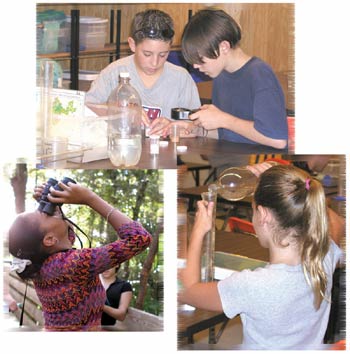Education Goes Outdoors

A watershed education program is giving Pasco County middle school students and teachers the opportunity to learn about Florida’s watersheds, including the Springs Coast Watershed. The program is called the Wetlands Ambassadors Program.
The District sponsors the Wetlands Ambassadors Program by funding the transportation, materials and supplies, and by assisting with the corresponding teacher training.
The program began during the 2002–2003 school year as a pilot project at Starkey Environmental Education Center, funded through the Southwest Florida Water Management District and the Pasco County School District. The building is maintained by Pasco County.
Environmental science instructor Jean Knight says that having the program at Starkey is a real benefit.
“The kids are familiar with the park. They come here with their families to ride their bikes and picnic and camp. Through participating in this field program they are learning about the habitats, wildlife and water resources here in the park,” said Knight. “Hopefully when they come out here again with their families they will share that knowledge.”
“Most of the kids are really excited to get out here. They are excited from the moment they get on the bus,” said Kerrin Vaccarello, who accompanied her Chasco Middle School classes.
Vaccarello and her teaching partner, Derrick Bunns, are two of the 37 teachers who took part in three days of training at the center to prepare for the school year. Vaccarello and Bunns have approximately 120 students split into four classes. Each one of their classes spends a day at Starkey after completing pre-trip curriculum.
“It is great that they are getting the hands-on experience and can actually see what we’ve been talking about in class,” said Vaccarello.
This academic year the program expanded to include the east side of the county. Because of the tight field-trip bus schedule, students on the east side of the county will visit the Cross Bar Ranch Center. Students do similar activities at both locations, which are also in the same watershed. All together, 3,000–4,000 seventh-grade students will be participating in the Wetlands Ambassadors Program during the school year.
The field-trip program at the environmental education centers involves hands-on learning that encompasses science, math, language arts, and social studies.
When the students arrive at the environmental education center, they are split into two groups. The classroom teacher takes a group into the lab for a lesson while the other group accompanies Knight outside to participate in a wetland exploration activity. In this activity students take on the roles of zoologist, botanist, hydrologist and geologist to study the characteristics of wetlands and their importance to people and wildlife. The student groups switch places after lunch.
Knight enjoys working with the seventh-graders.
“This is a good age group to work with. You can tap into their natural curiosity and interest in nature,” said Knight.
And while every group is different, Knight says there is a common thread in many of their comments.
“Hopefully they will come away with an appreciation of the natural world around them and feel some type of ownership so when they get older they will be more likely to protect it.”
Two dedicated volunteers assist Knight by answering the students’ questions about their assignments and by helping them see and hear what is there to discover.
Tony Mayotte is retired and works with the kids at the center all four days a week that the program is in operation. He learned about the need for volunteers last year from a friend volunteering at the park. Tony started volunteering with the program last school year, and enjoyed working with the students so much he decided to continue this year. Tony says that he likes to volunteer at the park because he enjoys seeing the looks on the kids’ faces when they discover something on their own.
Agnes Condon is also a busy volunteer at Starkey. This is the first year she’s worked with the students. Agnes volunteers one day a week with the students and works on other projects at the park. She learned about the program last year when Knight made a presentation asking for volunteers.
“The volunteers are a great benefit to the program,” said Knight. “They devote their own time to learn about the watershed so they can help the students learn while they are here.”
In addition to the volunteers, Knight expects at least 100 chaperones to accompany the classes taking part in the program during the school year.
Right now Tony and Agnes are the only two volunteers who work with the Wetlands Ambassador Program but Knight says she can always use more assistance.
For more information about the youth education programs in your county, please call the District’s Communications Department at 1-800-423-1476, ext. 4757.
